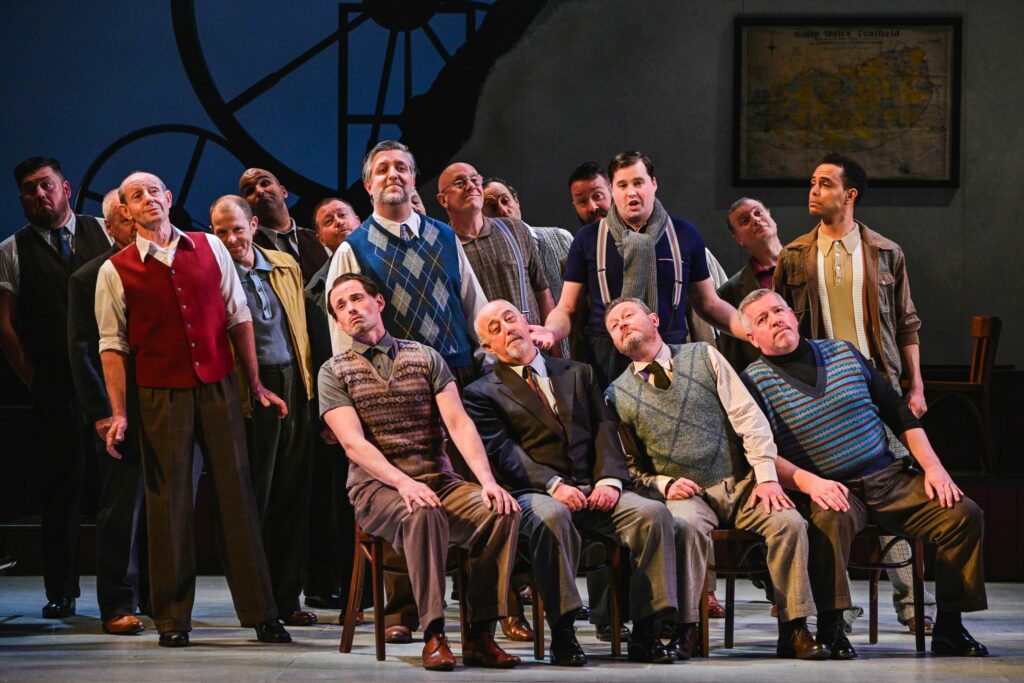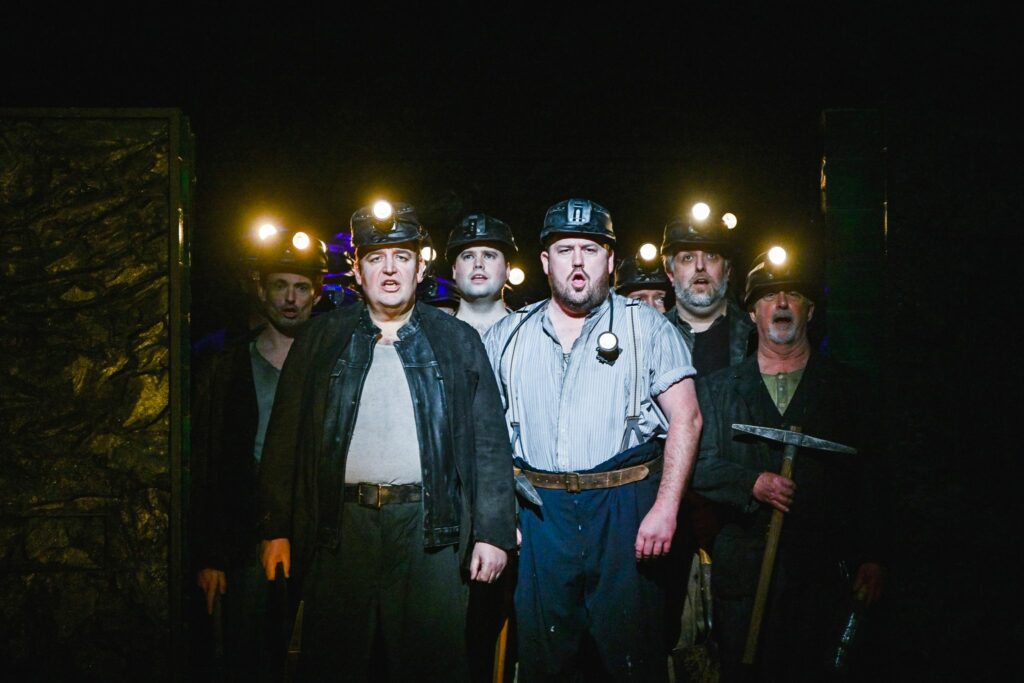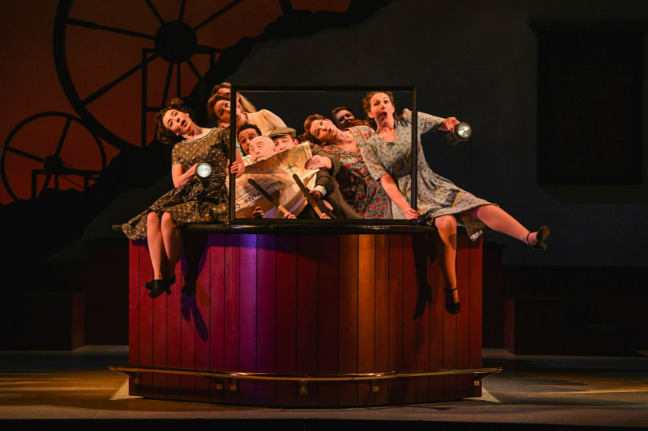To choose to tell the story of a choir in the medium of opera is inherently an ambitious task, but the Welsh National Opera certainly pulled it off with Blaze of Glory!, which, despite its downfalls, is an inspiring story and a musical feast like no other to be experienced in the world of Opera.
-
7
The Welsh National Opera’s brand-new original opera Blaze of Glory! took over the Mayflower Theatre in Southampton on Saturday night, as part of its UK tour. A really exciting night out, with a heart-warming, funny story, made even more magical by the fact that a lot of it is based on true events. The handful of questionable moments and some confusing story beats over the two-hour runtime of the show weren’t quite enough to take away from the enjoyment; but they didn’t go unnoticed, despite the visible passion and love that very clearly permeated the project.
The opera was developed, from conception, by a collaborative team made up of Director: Caroline Clegg, Librettist: Emma Jenkins, and Composer: David Hackbridge Johnson. Set in the 1950s, it tells the quintessentially Welsh story of a group of miners, who form a Male Voice Choir “as a panacea to heal the trauma of a recent mining disaster”. The Male Voice Choir is a beautiful Welsh tradition that, as the opera points out, allows hard-working, traditional men, such as the miners in the story, to discover a new side to their masculinity through music-making within their communities. While this is mentioned in the first few pieces (/songs? We’ll come back to the nomenclature of the music later), we don’t really get to see the men outside of their choir – or “Glee” as the characters call it – leaving this extremely interesting theme unexplored for the remainder of the story. But maybe the comedic genre that Blaze of Glory! inhabits just doesn’t have space for exploration of such themes.
Speaking of the comedy, I must admit that there were plenty of moments that genuinely made the audience laugh out loud, and every joke, whether in the script, choreography, or music, was written and delivered well enough to warrant at least an enthusiastic, joyous exhalation.
This may also have been a result of the wonderful performances of the entire cast. All amazing actors and musicians, it was a treat to watch every single character on stage at every moment, and that’s truly saying something since a lot of the scenes included the entire choir – the main collective protagonists of the story.
Standout praise must be given to the stellar performance of Jeffrey Lloyd-Roberts as Mr Daffydd Pugh, the leader of the choir, whose character was always emotionally invested and always convincingly so, and who sang and delivered every note with a masterful touch. I could go on naming the cast and highlighting bits of their performances at different points in the story, but there were too many for me to currently be able to do that in just one article. However, a special mention must be given to Megan Llewellyn, who stood in for the part of Miss Nerys Price for the Southampton show and did an amazing job at portraying the difficult role of a strong female figure in a “story about men” (quote from the opening number!). A favourite element of the show was certainly the singing of the choir. Not only was it a very powerful, inspiring sound, it was so perfectly precise and well-executed in every instance, even when their French pronunciation was bad on purpose!
A slightly uncomfortable plot point that seemed a little random was the introduction of the character of Anthony (Themba Mvula). A young African American GI, who also happens to be “queer” (to use an anachronism). While the sentiment of including representation of the diverse landscape in Welsh culture at the time is certainly appreciated and surely done in good faith, its insignificance to the story seemed extremely odd. It almost felt like there were supposed to be more story beats involving Anthony that got written out of the libretto at some point. Unfortunately giving him an “aria” about how he feels part of the community and then relegating him for the majority of the story left us with a weird feeling for the rest of the show. That, coupled with the reveal of his falling in love with Bryn (Feargal Mostyn-Williams) by, quite literally, just one “romantic” chord, really made the character feel like a token inclusion, which I am certain was not the intention of any of the creative team behind this.
The music in Blaze of Glory! was born out of a very commendable, interesting concept, true to the melting pot which was the cultural diversity of Wales at the time. The score incorporated a wide variety of contemporarily popular styles, including Bebop, Jazz, Big Band, Operetta, and acapella. All this, of course, on top of the music of the tradition of the Male Voice Choir, which in itself is varied, with the choir going from yodeling in French, to singing traditional Welsh hymns.
A concept that ambitious is a great risk to realise, however. While I admire the work of David Hackbridge Johnson, it is undeniable that the amalgamation of all these influences, as well as the operatic tradition in which the Welsh National Opera functions, came across as a little bit confused and non-committal to any one style, which made the nods to various influences seem somewhat disingenuous and disjointed. In fact, many sections of the show felt like they were plucked from a musical and put into an uncomfortable operatic shell, possibly due to the poor opera-trained voices of the amazing cast, who had to try to mould into these styles as best as they could. Having said that, while it wasn’t an artistic choice I would have expected, I really admired Llewellyn’s Miss Price, who was completely unapologetic in her dramatic operatic style, giving the fusion of the two genres an attitude reminiscent of Janecek’s “Cunning Little Vixen”. Either way, the creativity behind the score was exceptionally notable. The marriage and juxtaposition of completely different styles were very effective in important scenes and are truly like nothing else that came before it. Conclusively I allow myself to question, who am I to set creative boundaries for artists who want to stretch them, especially in this conventionally grandiloquent and prescriptivist tradition?
To choose to tell the story of a choir in the medium of opera is inherently an ambitious task, but the Welsh National Opera certainly pulled it off with Blaze of Glory!, which, despite its downfalls, is an inspiring story and a musical feast like no other to be experienced in the world of Opera.






